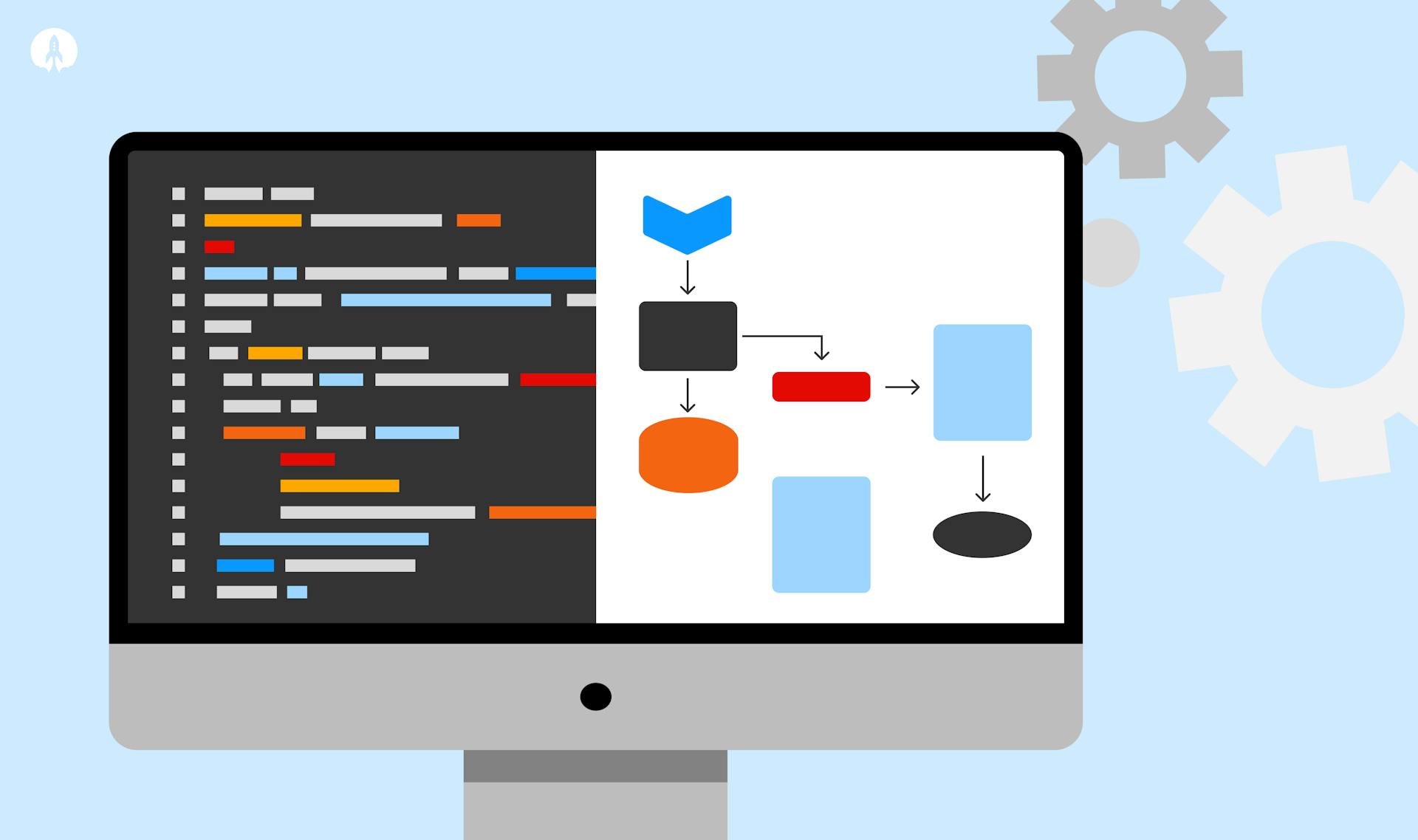Is Bespoke Software The Right Solution For Your Business Challenge?

We depend on software for a multitude of essential business tasks. When the software tools you use don't align with your specific workflows and needs, it can hinder more than help.
If you've exhausted off-the-shelf options and still feel like you're battling with your software, it's time to explore a different approach.
This is where the possibility of custom or bespoke software comes into play, offering the potential for a solution that truly supports your unique business challenges.
In this article, we cover everything you need to know about bespoke software, including:
✔️ What it is and how it differs from commercial software.
✔️ Key signs that your business could benefit from a bespoke solution.
✔️ The advantages and potential drawbacks to consider.
✔️ What to expect from the custom software creation process.
✔️ When off-the-shelf solutions might be a better choice.
What Is Bespoke Software?
Bespoke software (also called custom software or tailored software) is a software solution specifically designed and developed to meet the unique needs of an individual business or organisation.
A bespoke software solution is crafted from scratch to address specific workflows, pain points, and goals.

💡A Rocketmakers Case Study: The Performance Data Management System (PDMS)
To illustrate the power of bespoke software, let's consider the Performance Data Management System (PDMS) we developed for the English Institute of Sport (EIS):
The Challenge
EIS needed a new medical record system that could accommodate the specific needs of elite athletes, overcoming the limitations of their existing off-the-shelf solution.
Bespoke Solution
We collaborated with EIS to design PDMS from the ground up. This system addressed these unique requirements:
- Securely gathering data from athletes, coaches, and medical professionals.
- Complex permissions systems to protect sensitive data.
- Incorporating subjective data (mood, soreness) alongside objective performance metrics.
- User-friendly mobile app for athlete input.
The Impact
PDMS became essential to Team GB's success, helping optimise athlete performance while maintaining robust data security. It exemplifies how bespoke software can solve problems that generic, pre-built tools can't.

What Is “Off-the-Shelf” Software?
You will be hearing this term a lot, so let's define it. Off-the-shelf software refers to pre-made, commercially available software applications designed to serve many users and businesses.
These solutions offer a standardised set of features and functionalities to address everyday needs. Examples of standard off-the-shelf software products include Asana, Slack, HubSpot, QuickBooks, and SAP.
How Do You Know If You Need Bespoke Software?
Not every business problem warrants building a software solution from scratch. So, how do you know if bespoke software is the right option? Consider the following points:
Workarounds for Workarounds
Do you ever feel like you're constantly bending backwards to make your software work for you?
If off-the-shelf solutions never seem to be the right fit and force you to find creative (and sometimes frustrating) ways to adapt your workflows entirely, bespoke software might be the solution.
Here are a few common signs that your problems may be too unique for off-the-shelf software:
- You can't find the tools to handle essential aspects of your work.
- Your workarounds are more time-consuming than the original task should be.
- You spend more time battling your software’s limitations than getting actual work done.
Gaining a Competitive Edge
Sometimes, the best way to get ahead is to stop trying to fit into the mould created by generic software.
Could custom software development let you do things your competitors simply can't? Consider these possibilities:
➡️ A unique customer experience: In what ways would you improve your current systems to enhance customer experience? For example, imagine a custom online ordering system that makes your product configuration process incredibly smooth compared to the clunky experience your competitors offer.
➡️ Supercharged efficiency: What if you could automate tasks that other businesses in your field do manually, saving your team valuable time and reducing errors?
➡️ Data-driven insights: Custom software could integrate data from different parts of your business, giving you insights into trends and opportunities your competitors are missing.
Operational Bottlenecks
Is your software supposed to make your life easier, but it actually creates more work? If these scenarios sound familiar, it might be time to look beyond pre-built solutions:
➡️ You constantly have to export data from your software, manipulate it in spreadsheets, and then try to find a way to get it back into the system.
➡️ Your competitors use software tools that streamline workflows in ways your tools simply can't replicate.
➡️ Your team spends more time battling software limitations than focusing on their core tasks.
Custom software can be designed around how you work, removing these bottlenecks and freeing up your team to be more productive.
If you can relate to any of the issues outlined above, it's worth exploring the potential of a bespoke software solution.
The Benefits of Bespoke Software Solutions
When investing in custom software, you're choosing a solution that goes far beyond what any off-the-shelf product can provide. Here's why:
✅ Perfect fit: Bespoke solutions are designed around your specific business requirements, addressing pain points and streamlining tasks for maximum efficiency.
✅ Scalability: Your business isn't static, and your software shouldn’t be either. Custom solutions can be built with growth in mind, effortlessly adapting to your changing needs.
✅ Long-term cost savings: While the initial investment in custom software can be higher, you avoid recurring subscription fees, the cost of unused modules, and the potential headaches of outgrowing off-the-shelf solutions. More on this below!
✅ Intellectual property ownership: You own your bespoke software, giving you complete control over its development process, source code, updates, and future. This eliminates vendor lock-in and potential disruptions.
✅ Control and customisation: A pre-packaged solution often leaves you at the mercy of vendor security updates and generic protection measures. With your bespoke software, you gain the ability to design and implement security protocols, encryption, and access restrictions uniquely tailored to protect your sensitive data and business operations.
✅ Innovation potential: Don't let generic software limit what you can achieve. A bespoke system allows you to implement innovative features, processes, or integrations that give you a distinct competitive advantage.
✅ Enhanced efficiency: Perhaps the most significant benefit of bespoke software is its ability to optimise your operations. By eliminating workarounds, automating tedious tasks, and providing seamless workflows, custom software saves you time, reduces errors, and lets your team focus on what matters most.

The Downsides of Bespoke Software Development
High Initial Cost
The biggest hurdle is often the up-front investment. Custom development means building the software from scratch, incurring design, coding, testing, and deployment costs.
While it's true that the initial investment is significant when choosing tailored software, it's essential to focus on the long-term ROI.
Custom software avoids ongoing subscription fees, the need to purchase any unnecessary modules typically associated with off-the-shelf products, and the potential costs of forcing your unique processes to fit into existing software.
🏆 Solution: If cost is a concern, consider a phased development approach to spread the costs over time by first building the most crucial features and iterating from there.
Longer Development Time
Unlike off-the-shelf solutions that are ready to use, custom software does take time to build and deploy properly.
Despite the time it takes, the result would be a product that perfectly fits your workflow, potentially saving you time and improving efficiency in the long run.
🏆 Solution: Communicate clearly with your chosen software developers, create a detailed project timeline, and set milestones for feedback and testing to keep the project on track.
Maintenance and Support
Custom solutions typically require ongoing maintenance to fix bugs, implement updates, and ensure compatibility with evolving technology.
You'll either need in-house technical expertise or a continuing relationship with the development team.
While bespoke software requires investment in maintenance and support, it's crucial to compare this with off-the-shelf solutions’ costs, which are often hidden.
These costs can relate to mandatory updates, security patches, and potentially rigid support contracts. For a thorough cost-benefit analysis, consider the long-term expenses of both options.
🏆 Solution: Negotiate a post-development support plan as part of the project, whether with the original developers or by training in-house technical staff.
Dependence on Developers
Changes, updates, and even troubleshooting are often reliant on the original developers or a team with a deep understanding of the software's code base.
If those resources are not readily available, it can result in a vulnerability. Luckily, well-documented code and knowledge transfer during development can mitigate this risk.
🏆 Solution: Choose a development partner focused on transparency and providing thorough documentation. Some even offer options for knowledge transfer as part of the ongoing support agreement.
Risk of Project Failure
Even with the best planning, custom software projects can fail to meet requirements due to miscommunications, scope changes, or technical difficulties.
The risk is significantly reduced when working with reputable developers with solid track records and detailed project planning.
🏆 Solution: Emphasise clear communication, prioritise a user-focused design and development approach, and implement regular testing phases to catch any issues early on.
No Product Is Available for Reviews
Bear in mind that you cannot test bespoke software beforehand because it is created entirely from scratch, and since the product is still developing, you cannot read any user reviews.
Ultimately, you’ll have to have faith in the developers you’re working with to produce reliable, well-thought-out software.
It's true that with bespoke software, you won't find the familiar comfort of pre-existing online reviews or user ratings to guide your decision.
However, the lack of traditional reviews doesn't mean you're going blind. Bespoke development offers unique opportunities for different kinds of assessment and validation.
🏆 Solution:
- Focus on the development team's track record: Dive into their portfolio, case studies, and client testimonials for evidence of successful projects and satisfied customers.
- Prioritise clear communication and collaboration: Establish a development process with frequent feedback loops, testing phases, and opportunities for your input.
- Take a phased approach: Break down development into phases with set milestones for review and feedback. This allows for course correction and ensures the project aligns with your expectations.

It's important to manage your expectations. The development timeline for bespoke software will vary based on the complexity of your project. Work closely with your development team to establish realistic expectations, setting clear milestones and communication channels to monitor progress
The Custom Software Development Process
Building successful bespoke software involves more than just coding. Here's a (very simplified!) breakdown of the key stages:
Step 1: Finding a Partner
Not all developers are equal. Thoroughly research potential custom software development companies. Consider their industry experience, proven track record, technologies they specialise in, and communication style.
🚀 Need help navigating the process? Rocketmakers is a software development studio with expertise in crafting bespoke software solutions tailored to your specific challenges.
Our collaborative and results-driven approach ensures that your software investment drives tangible business success. Contact us to explore how we can help bring your vision to life.
Step 2: Discovery
The groundwork for your software product starts once you have found a suitable development partner.
You'll work closely with the development team to analyse your business needs, define the problem your software will solve, pinpoint desired outcomes, and understand your end-users’ requirements.
Step 3: Development and Collaboration
Bespoke software development is rarely a linear process. Expect an iterative approach that includes:
- Prototyping and design: Getting early visual representations of your software for feedback.
- Regular testing: Identifying and troubleshooting potential issues throughout development.
- Communication and feedback: Maintaining open dialogue with your development team is essential to ensure the project stays on track.
Step 4: Deployment and Support
A smooth transition to the new software is crucial. This might involve data migration, user training, and a phased rollout.
Plan for bug fixes, updates, and potential new features as your business and the technology landscape evolve.
💡Pro-tip: The specific methodologies (Agile, Waterfall, etc.) and exact steps may vary between development companies. Finding a partner with a well-defined, transparent process that emphasises collaboration at every stage is key.
How Much Does Bespoke Software Development Cost?
If you are ready to choose bespoke software, it naturally begs the question: How much will this cost?
Unfortunately, there's no simple answer to this question. The cost of bespoke software development depends on numerous factors, making it impossible to determine a one-size-fits-all price tag.
However, we can provide insights to help you understand the variables and what to expect. Below, we’ll explore the factors that directly affect the cost of bespoke software:
➡️ Feature complexity: The more complex and unique features the app requires, the higher the development cost could be. So, keeping it simple will be cheaper.
➡️ Technology stack: The programming languages, frameworks, and tools chosen directly impact development costs. Some technologies require specialised skills (which can be more expensive) or have licensing fees for commercial use.
➡️UI/UX: While visually appealing elements like custom graphics and animations can enhance the experience, they also increase development costs.
➡️Scalability: Building in scalability initially can require a larger budget, but it minimises the risk of costly overhauls later. Opting for gradual scaling might be more budget-friendly initially, but it's essential to factor in the potential costs of future upgrades.
➡️Regulatory compliance: Addressing regulatory requirements early in development can prevent costly rework later.
➡️Testing and QA: Thorough testing is essential but expensive, especially when covering numerous scenarios and devices.
➡️Data model and application complexity: The complexity of your data model and application domain directly impacts development time and costs. Simpler models and domains require less planning and streamlined development, saving costs.
➡️Client experience: A client's familiarity with the software development process can directly impact project timelines. Less experienced clients may require more time to make decisions and learn, potentially extending the overall project duration.

When budgeting for a bespoke software project, focusing on the up-front cost is tempting. However, a successful project requires a realistic approach that includes both development timelines and the ongoing expenses needed to ensure your software continues to deliver value over the long term
What Are the Alternatives to Bespoke Software Solutions?
While custom software offers distinct advantages, there are situations when bespoke software may not be the answer. Consider these scenarios:
Tight Deadlines
Building custom software from the ground up might not be feasible if you're facing a critical deadline. Configuring pre-existing software or streamlining processes with readily available tools could offer a faster solution.
You Have a Limited Budget
Bespoke software's up-front costs can be significant. It might be a more budget-friendly option if a suitable off-the-shelf solution exists, even if minor customisation is required.
Simple Problems
For straightforward needs, investing in bespoke software might be excessive.
There's no need to reinvent the wheel - if readily available off-the-shelf tools can solve your problem, a custom solution probably isn't the best use of your time or money.
Let's say you need to integrate payment processing into your website. Building a custom payment platform from scratch would be complex and costly.
Utilising a proven and secure off-the-shelf payment solution like Stripe or PayPal is a far more efficient and reliable approach.
Off-The-Shelf Alternatives
Similar to catering to more straightforward needs, a more time- and cost-effective path would be possible if pre-built software can be adapted to meet most of your requirements through features, plugins, or integrations.
For example, an accounting firm needs a new accounting software system, but it finds that a leading off-the-shelf accounting package covers 90% of its specific requirements.
They might be better served by customising that software with plugins or integrations for the remaining 10% rather than investing in completely bespoke accounting software.
Remember, these scenarios don't negate the value of bespoke software in the long run.
However, alternative solutions might be the most practical initial approach for immediate needs, simplicity, or budget constraints.
Wrapping Up: The Power of Bespoke Software
When mass-market commercial software solutions hinder rather than help your business, bespoke software offers a (tailor-made!) solution. By creating software to your exact requirements, you gain:
➡️ Efficiency and productivity: Eliminate workarounds, streamline processes, and free your team to focus on what matters most.
➡️ Competitive advantage: Implement innovative features or integrations that set you apart.
➡️ Scalability and adaptability: Build software that grows and evolves alongside your business.
➡️ Ownership and control: Maintain full control over your software's development and future.
Is It the Right Choice for You?
Before embarking on custom software development, a careful assessment is crucial. Weigh the potential benefits against the initial investment, timelines, and the need for ongoing support.
If the long-term gains in efficiency, innovation, and competitive edge outweigh the costs, bespoke software could be the key to unlocking your business's full potential.
🚀 We’re Rocketmakers
If you're ready to explore custom software solutions, Rocketmakers can help. Our expertise in developing enterprise-level software will ensure you get tailored solutions that drive your business’s success.
Get in touch with us to discover how bespoke software can transform your operations.



